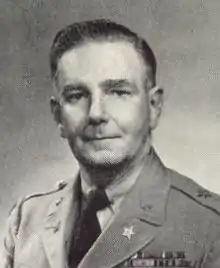Robert A. McClure
Robert Alexis McClure (March 4, 1897 – January 1, 1957) was an American general and psychological warfare specialist, who is considered as a Father of U.S. Army Special Warfare.
Robert Alexis McClure | |
|---|---|
 McClure as a Brigadier General | |
| Born | March 4, 1897 Mattoon, Illinois |
| Died | January 1, 1957 (aged 59) Fort Huachuca, Arizona |
| Allegiance | |
| Service/ | |
| Years of service | 1917-1956 |
| Rank | |
| Unit | |
| Battles/wars | World War I World War II Cold War |
| Awards | Distinguished Service Medal (2) Legion of Merit (2) Bronze Star Medal |
Biography
Born in Mattoon, Illinois, he graduated from the Kentucky Military Institute in 1915. He initially joined the Philippine Constabulary before joining the regular army in 1917.
In 1941 he served as military attaché to the American Embassy in London before being appointed by general Dwight D. Eisenhower to chief of intelligence for the European theater of operations in 1942. Eisenhower next placed him in charge of the Allied Forces Information and Censorship Section which was responsible for the operation of twelve radio stations as well as the censorship of troop mails and cables.
McClure was appointed director of the newly created Psychological Warfare Division of SHAEF in 1944. With the end of the war in Europe he was responsible for the Information Control Division which controlled broadcasting and newspapers in Germany during the early stage of the occupation.
After the invasion of Korea in 1950, beginning the Korean War, the Office of the Chief of Psychological Warfare was formed in Washington, D.C., headed by McClure. During his tenure, the Psychological Warfare Center was established at Fort Bragg, North Carolina which centralized the newly formed Psychological Warfare School and 10th Special Forces Group at a single location.
In 1952, McClure was assigned to Iran as chief of three U.S. Military Missions, where he played a role in the 1953 d'état[1] and formed a close relationship with the Shah.
He retired from the Army in 1956 and died of a heart attack soon after at Fort Huachuca, Arizona.
Decorations
During his 39 years of the military career, Major General McClure received a number of military awards, including some foreign decorations.
Here is his ribbon bar:
| 1st Row | Army Distinguished Service Medal with Oak Leaf Cluster | Legion of Merit with Oak Leaf Cluster | ||||||||||||||
|---|---|---|---|---|---|---|---|---|---|---|---|---|---|---|---|---|
| 2nd Row | Bronze Star Medal | World War I Victory Medal | American Defense Service Medal with Foreign Service Clasp | American Campaign Medal | ||||||||||||
| 3rd Row | European-African-Middle Eastern Campaign Medal with 3 Service Stars | World War II Victory Medal | Army of Occupation Medal with Germany Clasp | National Defense Service Medal | ||||||||||||
| 4th Row | Order of the British Empire, Commander | Legion of Honor, Officer (France) | Croix de guerre 1939–1945, with Palm (France) | Order of the Crown, Officer (Belgium) | ||||||||||||
| 5th Row | Order of the Crown of Italy, Grand Officer | Order of Glory, Knight of First Class (Tunisia) | El Alonena (Morocco) | Order of the Chin Hsin, with Rosette Special Class (China) | ||||||||||||
| 6th Row | Military Order of Merit, (Iran) | Polonia Restituta, Officer (Poland) | Order of the Lion and the Sun, Grand Officer (Iran) | Order of the Crown, Grand Officer (Iran) | ||||||||||||
External links
- Colonel Alfred H. Paddock Jr. "Major General Robert Alexis McClure: Forgotten Father of US Army Special Warfare". www.psywarrior.com.
References
- Abrahamian, Ervand (2013). The Coup: 1953, the CIA, and the roots of modern U.S.-Iranian relations. New York: The New Press. pp. 157–158, 188. ISBN 978-1-59558-826-5.
